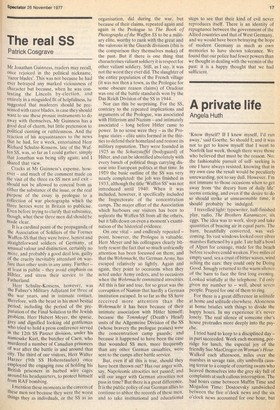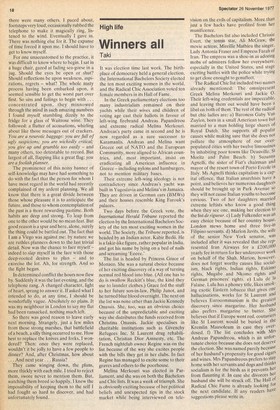A private life
Angela Huth
'Know thyself? If I knew myself, I'd run away,' said Goethe. So should I; and it was not to get to know myself that I went to Norfolk last week, though there were those who believed that must be the reason. No: the fashionable pursuit of selfseeking is one I have always resisted, knowing that in my own case the result would be peculiarly unrewarding, not to say dull. However, I'm not immune to those occasions when to get away from 'the dreary hum of daily life' seems enticing, and even if the desire to do so should strike at unseasonable time, it should probably be indulged.
I travelled light: typewriter, half-finished play, radio, The Brothers Karatnazov, six eggs. The idea was to work, sleep and take quantities Of bracing air in equal parts. The barn, beautifully converted, was welcoming. Its vast windows looked over silver marshes flattened by a gale. I ate half a bowl of Alpen for courage, made for the beach before resolves could weaken. Five miles of empty sand, sea a crust of bitter waves, wind aching the ears: they could only be Doing Good. Smugly returned to the warm silence of the barn to face the first long evening. Looked wistfully at the telephone. I'd only given my number to — well, about seven people. Prayed for one of them to ring.
For there is a great difference in solitude at home and solitude elsewhere. Aloneness at home bristles with things to divide the happy hours. In my experience it's never lonely. The real silence of someone else's house protrudes more deeply into the psyche.
I tried hard to keep to a disciplined day — in part succeeded. Work each morning, porridge for lunch, the especial joy of the friendly Sue MacGregor on Woman's Hour. Walked each afternoon, miles over the marshes in savage rain, city umbrella causing terror to a couple of courting swans who heaved themselves into the grey sky full of complaints at such callous interruption. The bad hours came between Muffin Time and Mogadon Time: Dostoevsky sandwiched between the five o'clock news and the six o'clock news accounted for one hour, but there were many others. I paced about, footsteps very loud, occasionally rubbed the telephone to make it magically ring, listened to the wind. Eventually I gave in. There was nothing else for it. The expanse of time forced it upon me. I should have to get to know myself.
For one unaccustomed to the practice, it was difficult to know where to begin. I sat in a huge chair, gazed at fading sea-gorse in a jug. Should the eyes be open or shut? Should reflections be upon weakness, aspi rations, regrets — what? The whole nasty process having been embarked upon, it seemed sensible to get the worst part over first. So sins and failings to begin with . . .
concentrated upon, they minnowed through the mind in such amazing numbers I found myself, stumbling dizzily to the fridge for a glass of Waitrose wine. They followed: a flutter of accusations, whirling about like those messages out of crackers.
You are a neurotic baggage: you are full of ugly suspicions; you are wickedly critical; you give up and grumble too easily — and many others, too detestable to record. But largest of all, flapping like a great flag: you are a foolish planner.
The prominence of this noisy banner of self-knowledge may have had something to do with the fact that the person for whom I have most regard in the world had recently complained of my ardent planning. We all know that there is a-great divide between those whose pleasure it is to anticipate the future, and those to whom contemplation of the past is a 'bore rewarding pastime. Both habits are deep and strong. To kap from one to the other would be no mean feat. But good reason is a spur and here, alone, surely the thing could be battled out. The fact that I am a Virgo was against me: by nature we are ruthles planners down to the last trivial detail. Now was the chance to face myself— indeed to slap myself in the face with those deep-rooted desires to plan — and to exorcise the lot. Ah, for strength. And so the fight began.
In determined conflict the hours now flew by. Suddenly it was the last evening, and the telephone rang. A changed character, light of heart, sprang to answer it. If asked what I intended to do, at any time, I should be wonderfully vague. Absolutely no plans. It was my neighbour in London to say my flat had been ransacked, nothing much left.
So there was good reason to leave early next morning. Strangely, just a few miles from those strong marshes, that battlefield of a beach, a silly thing occurred to me. How best to replace the knives and forks, I wondered? Then: once they were replaced, wouldn't it be jolly to have a few people to dinner? And, after Christmas, how about . . . And next year. . Russia?
They came winging down, the plans, more thickly with each mile. I tried to reject them, swore never to mention them. But, watching them breed so happily, I knew the impossibility of keeping them to the self I had fought so hard to discover, and had unfortunately found.







































 Previous page
Previous page